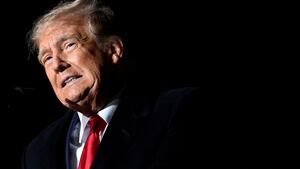The Jan. 6 House Select Committee tore into Trump and Co.’s assertions that the election was stolen on Monday, calling the notion “a big scam.”
Following its final hearing, the committee published a summary of its widely anticipated final report, which is set to be released early next year. In addition to what it revealed about the former president’s bogus claims of election fraud, it also pointedly noted that key figures in Trump’s inner circle had not been exactly “forthcoming” in their testimony—including his daughter Ivanka Trump, who they said appeared to suffer from memory issues under questioning.
While the committee acknowledged that witnesses such as former White House Counsel Pat Cipollone and onetime Trump lawyer and senior adviser Eric Herschmann gave “particularly important account[s] of the events of January 6th,” not all of its witnesses “were entirely frank or forthcoming.” As examples, the summary named-and-shamed Ivanka and former Trump press secretary Kayleigh McEnany.
Both women, according to the executive summary, “displayed a lack of full recollection of certain issues, or were not otherwise as frank or direct as Cipollone.”
Ivanka Trump, who was in the West Wing with her father as rioters stormed the Capitol, gave roughly eight hours of testimony to the committee in April. It was reported that she did not seek to evoke any kind of privilege, but it was not clear at the time how beneficial her testimony had been. (Her husband, Jared Kushner, had been questioned days earlier in a session that one panel member called “helpful.”)
On Monday, the committee said that Ivanka had “acknowledged” a number of claims surrounding her final months as a White House adviser, including that she had agreed with then-Attorney General William Barr there was “no evidence” of significant election fraud; that Trump had leaned on his vice president regarding electoral votes on the morning of Jan. 6; and that he had watched the violence at the Capitol unfold on television “as it was occurring.”
“But again,” the committee continued, “Ivanka Trump was not as forthcoming as Cipollone and others about President Trump’s conduct.” It added that her former chief of staff, Julie Radford, had presented “a more specific recollection of Ivanka Trump’s actions and statements.”
Kayleigh McEnany’s testimony to the committee was more scathingly described in the summary as “evasive, as if she was testifying from pre-prepared talking points.” Her cagey disposition similarly put her at odds with her own staff, who were far more “forthright” about McEnany’s activities and words.
The panel also accused others, including Trump lawyer Rudy Giuliani, of backtracking on their public positions. It noted that the former mayor of New York City, who baselessly fumed that “phony Dominion voting machines” had changed the election result in December 2020, quietly reversed his position during his May testimony—conceding that the devices hadn’t flipped votes from Trump to Joe Biden.
“[H]e admitted during his Select Committee deposition that ‘I do not think the machines stole the election,’” the summary states.
Beyond Giuliani, other Trump allies were seen as “unnecessarily combative” in their testimony, ducking “hundreds” of questions and providing “highly questionable rationalizations,” the committee said. Some witnesses who allegedly resisted questioning included those whose income or jobs remain tied to Trump or his affiliates, like the America First Policy Institute.
Some witnesses, including ex-National Security Advisor Michael Flynn, fringe player Phil Waldron, and lawyers Jenna Ellis and John Eastman, “all invoked their Fifth Amendment privilege against self-incrimination when asked by the Select Committee what supposed proof they uncovered that the election was stolen,” according to the summary.
But whether they cooperated or resisted, no one summoned before the panel were able to provide a scrap of evidence to back up their claims that the election had willfully been rigged. “In short, it was a big scam,” a footnote in the executive summary states.
The committee promised that the public will soon be able to pour over the testimony transcripts, hinting that they contained “a range of evidence suggesting specific efforts to obstruct the Committee’s investigation.” It said it was “aware of multiple efforts by President Trump to contact Select Committee witnesses,” and added that the Justice Department “is aware of at least one of those circumstances.”
Read it at NBC News







